
Journal of Blood Medicine
Scope & Guideline
Pioneering Discoveries: Shaping the Future of Hematology
Introduction
Aims and Scopes
- Hematological Disorders and Treatments:
The journal extensively covers a range of hematological disorders, including sickle cell disease, thalassemia, hemophilia, and various types of leukemia. It aims to provide insights into their pathophysiology, clinical management, and innovative therapies. - Transfusion Medicine:
Research related to blood transfusion practices, complications, and innovations in transfusion therapy is a core focus, including studies on blood donation practices, blood safety, and the efficacy of transfusion interventions. - Epidemiology and Public Health:
The journal publishes epidemiological studies that explore the prevalence, risk factors, and health outcomes associated with blood disorders, particularly in diverse populations and resource-limited settings. - Laboratory Techniques and Biomarkers:
There is a significant emphasis on laboratory advancements, including novel biomarkers for disease diagnosis and monitoring, as well as improvements in blood testing methodologies. - Genetic and Molecular Research:
The journal promotes research into the genetic and molecular underpinnings of blood disorders, including studies on mutations, gene therapy, and other molecular interventions.
Trending and Emerging
- Personalized and Precision Medicine:
There is a growing trend towards personalized approaches in the treatment of hematological diseases, particularly in the context of genetic profiling and tailored therapies for conditions like acute myeloid leukemia and hemophilia. - COVID-19 Related Hematological Research:
Research addressing the hematological complications associated with COVID-19, such as coagulopathy and immune thrombocytopenia, has surged in response to the pandemic, highlighting the interplay between infectious diseases and blood disorders. - Innovations in Hematopoietic Stem Cell Transplantation:
Emerging studies are focusing on advancements in hematopoietic stem cell transplantation, including novel conditioning regimens and post-transplant care strategies, reflecting the evolving landscape of treatment options. - Real-World Evidence and Observational Studies:
There is an increasing emphasis on real-world evidence studies that assess treatment outcomes and patient experiences in diverse settings, providing valuable insights into the effectiveness of therapies. - Interdisciplinary Approaches to Blood Disorders:
The journal is seeing a rise in interdisciplinary research that integrates insights from immunology, genetics, and public health to address complex blood-related issues, promoting a more holistic understanding of these conditions.
Declining or Waning
- Traditional Hematological Treatments:
There is a noticeable decrease in publications focused solely on traditional treatment modalities for hematological disorders, such as older chemotherapy regimens, as newer targeted therapies and immunotherapies gain prominence. - General Blood Donation Awareness:
Research centered on general awareness campaigns about blood donation seems to be waning, likely as the focus shifts towards more nuanced studies about specific populations and their unique blood donation practices. - Basic Laboratory Techniques:
With advancements in technology, there is a reduced emphasis on basic laboratory techniques in hemotherapy research, as the field moves towards more sophisticated methodologies and automation.
Similar Journals
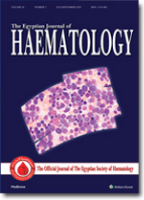
Egyptian Journal of Haematology
Exploring Breakthroughs in Blood Health and DiseaseThe Egyptian Journal of Haematology, published by WOLTERS KLUWER MEDKNOW PUBLICATIONS, stands as a pivotal resource in the field of hematology, particularly within the context of Egypt and the broader Middle Eastern region. This journal is dedicated to disseminating high-quality research that explores the latest advancements in blood disorders, hematologic malignancies, and transfusion medicine. With a focus on original research, case studies, and reviews, it aims to provide a comprehensive platform for hematologists, researchers, and healthcare professionals to enhance their understanding and management of hematological conditions. Although it is not an open-access journal, the rigorous peer-review process ensures that only the most impactful studies are published, contributing to the journal's reputation in the academic community. The Egyptian Journal of Haematology serves as an essential tool for advancing knowledge, improving clinical outcomes, and fostering collaboration among experts in the field.

BLOOD REVIEWS
Unveiling the latest in blood research and treatment.BLOOD REVIEWS is a highly regarded journal published by Churchill Livingstone, specializing in the fields of Hematology and Oncology. With an impressive Q1 ranking in both disciplines and placing in the top 10% of its peer categories according to Scopus metrics, it provides an essential platform for the dissemination of cutting-edge research and reviews pertaining to blood disorders and cancer treatment. Since its inception in 1987 and continuing through 2024, the journal has established itself as a cornerstone for healthcare professionals, researchers, and students who seek to advance their understanding of hematologic and oncologic topics. While not an open-access journal, BLOOD REVIEWS retains a reputation for delivering high-quality, peer-reviewed articles that foster dialogue and innovation within the scientific community. For those in the United States and beyond, the journal serves as a vital resource, housed at the Journal Production Department in Edinburgh, Scotland, ensuring accessibility and a global reach in its critical academic contributions.
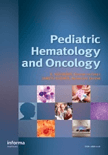
PEDIATRIC HEMATOLOGY AND ONCOLOGY
Fostering dialogue in the realm of child health and treatment.Pediatric Hematology and Oncology, published by Taylor & Francis Inc, serves as a vital platform dedicated to the fields of hematology, oncology, and pediatrics, providing a comprehensive avenue for the dissemination of scholarly research and clinical advancements. With an ISSN of 0888-0018 and an E-ISSN of 1521-0669, this journal has successfully converged its expertise over the years from 1984 to 2024. Ranked in the Q3 category for Hematology and Oncology, alongside a Q2 ranking in Pediatrics, Perinatology, and Child Health (2023), it engages a diverse readership comprising researchers, healthcare professionals, and students eager to explore groundbreaking studies in child health and treatment methodologies. While it currently does not offer Open Access options, the journal is widely cited and recognized, particularly in its specialized fields, fostering a rich environment for dialogue and innovation in the management of pediatric hematological and oncological disorders. The journal is based in the United Kingdom at 530 Walnut Street, Ste 850, Philadelphia, PA 19106, making it an essential resource for those pursuing excellence in pediatric medical research.
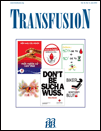
TRANSFUSION
Exploring New Frontiers in Blood Donation and TransfusionTRANSFUSION is a prestigious peer-reviewed journal published by WILEY, dedicated to advancing the field of hematology and transfusion medicine. With an ISSN of 0041-1132 and an E-ISSN of 1537-2995, this journal serves as a vital resource for researchers and professionals alike, delivering high-quality studies and reviews that impact clinical practice and blood management strategies. The journal enjoys a strong reputation, evidenced by its impressive Q1 ranking in hematology and Q2 in both immunology and allergy as of 2023. Covering foundational aspects from 1958 to 2024, TRANSFUSION not only provides valuable insights but also fosters collaboration and innovation in understanding the complexities of blood donation, transfusion practices, and immunological responses. With its significant contributions to the scientific community, this journal is essential for those seeking to stay at the forefront of research and advancements in transfusion science.
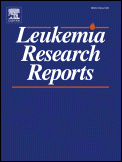
Leukemia Research Reports
Leading the charge in blood disorder research.Leukemia Research Reports, published by Elsevier Advanced Technology, is a prominent open-access journal dedicated to the latest advancements in the field of hematology and oncology. Since its launch in 2012, this journal has been a vital resource for researchers, healthcare professionals, and students aiming to disseminate and access high-quality research articles focused on various aspects of leukemia and related blood disorders. With an impact factor indicative of its significance in the field, Leukemia Research Reports currently holds a Q3 quartile ranking in both Hematology and Oncology, and is included in key databases such as Scopus. The journal not only embraces a commitment to open access, ensuring that research is freely available, but also actively promotes collaborations that strive to enhance our understanding and treatment of leukemia. Based in the United Kingdom, this journal continues to play a crucial role in fostering innovation and knowledge sharing within the medical community.
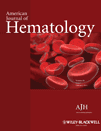
AMERICAN JOURNAL OF HEMATOLOGY
Leading the Charge in Hematology InnovationAmerican Journal of Hematology, published by Wiley, stands as a premier outlet for the dissemination of cutting-edge research in the field of hematology. With a commendable impact factor and ranked #9 out of 137 in the Scopus medicine category, this journal has established a robust presence since its inception in 1976. Operating in the Q1 quartile for hematology, it serves as a crucial resource for researchers, clinicians, and students dedicated to understanding blood disorders and advancing treatment methodologies. While the journal does not currently offer open access options, it remains highly regarded for its rigorous peer-review process and impactful contributions to the scientific community. With coverage extending into 2024, the American Journal of Hematology is committed to fostering innovation and collaboration within the hematological sciences.
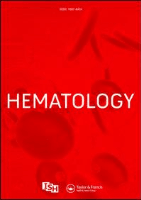
Hematology
Advancing Hematology: Where Innovation Meets InsightHematology is a distinguished open-access journal published by Taylor & Francis Ltd, dedicated to advancing research and knowledge in the field of hematology. Established in 1996, the journal has continually evolved to meet the needs of a growing community of researchers and practitioners, providing a vital platform for disseminating innovative findings and clinical insights. With its impact factor reflecting a robust commitment to quality scholarship, Hematology has achieved a respectable position in its category as evidenced by its Q3 ranking in the Hematology category and ranks #85 out of 137 in the Scopus index, which positions it in the 38th percentile among its peers. The journal’s open-access policy, initiated in 2019, further enhances its reach and accessibility, allowing a broad audience of professionals, researchers, and students to engage with high-quality research without barriers. By covering a wide range of topics related to blood disorders, treatment methodologies, and emerging therapies, Hematology stands as an essential resource for those dedicated to innovation in this critical area of healthcare.
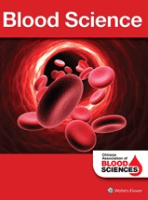
Blood Science
Exploring the Frontiers of Blood ScienceBlood Science is a distinguished peer-reviewed journal published by Lippincott Williams & Wilkins, focusing on the dynamic field of hematology. Since its inception, the journal has aimed to disseminate high-quality research and innovative findings that contribute to our understanding of blood-related health issues. With the ISSN 2543-6368, it offers a platform for academic discussions and breakthroughs in various subfields including hematopathology, blood disorders, and transfusion medicine. As of 2023, Blood Science is ranked in the third quartile (Q3) within the hematology category, indicating a burgeoning influence among its peers, with a Scopus rank of #101 out of 137 journals, placing it in the 26th percentile. Although it is not an open-access journal, it provides essential insights and valuable data for researchers, healthcare professionals, and students alike, enhancing the collective knowledge and practices in hematology. With a publication period spanning from 2019 to 2024, Blood Science remains committed to fostering the advancement of blood science research and enhancing patient care methodologies.

Blood Transfusion
Enhancing Lives Through Blood Transfusion Innovations.Blood Transfusion is a leading journal in the fields of Hematology, Immunology, and Medicine, published by SIMTIPRO SRL in Italy. With its ISSN 1723-2007, the journal has established a significant presence in the academic community, as evidenced by its positioning within the Q2 category in Hematology and Medicine (miscellaneous) and Q3 in Immunology and Allergy for 2023. Notably, it ranks #38 out of 137 in the Hematology category, showcasing its impactful contributions to research and practice. Operating under a traditional publishing model, this journal provides valuable insights into advances in blood transfusion science, ultimately aimed at enhancing patient care and outcomes. Spanning from 2003 to 2024, the scope of Blood Transfusion covers a wide range of topics related to hematological and immunological research, making it an essential resource for researchers, healthcare professionals, and students engaged in these critical fields.
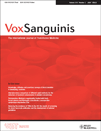
VOX SANGUINIS
Exploring the Frontiers of Blood MedicineVOX SANGUINIS is a distinguished peer-reviewed journal in the fields of Hematology and Medicine, published by Wiley, a leading academic publisher based in the United Kingdom. With a rich history dating back to its inception in 1952, this journal has consistently provided a platform for innovative research and insightful reviews, advancing the understanding of blood-related disorders and therapies. As evidenced by its robust performance—ranking #57 out of 137 in Scopus for Medicine in Hematology and holding a Q2 classification in both Hematology and miscellaneous Medicine categories—VOX SANGUINIS is recognized for its significant contributions to the scientific community. This journal serves as a vital resource for researchers, professionals, and students alike, fostering knowledge exchange and collaboration within the field. With its ongoing commitment to quality and integrity, VOX SANGUINIS continues to shape the future of hematological research well into 2024 and beyond.